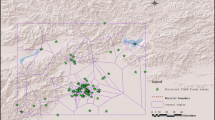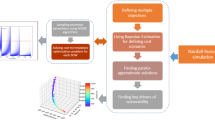Abstract
Precise comprehensive evaluation of flood disaster loss is significant for the prevention and mitigation of flood disasters. Here, one of the difficulties involved is how to establish a model capable of describing the complex relation between the input and output data of the system of flood disaster loss. Genetic programming (GP) solves problems by using ideas from genetic algorithm and generates computer programs automatically. In this study a new method named the evaluation of the grade of flood disaster loss (EGFD) on the basis of improved genetic programming (IGP) is presented (IGP-EGFD). The flood disaster area and the direct economic loss are taken as the evaluation indexes of flood disaster loss. Obviously that the larger the evaluation index value, the larger the corresponding value of the grade of flood disaster loss is. Consequently the IGP code is designed to make the value of the grade of flood disaster be an increasing function of the index value. The result of the application of the IGP-EGFD model to Henan Province shows that a good function expression can be obtained within a bigger searched function space; and the model is of high precision and considerable practical significance. Thus, IGP-EGFD can be widely used in automatic modeling and other evaluation systems.
Similar content being viewed by others
References
Chen, S. Y., 1990. Fuzzy Hydrology and Theory of Fuzzy Optimization of Water Resources Systems. Dalian University of Technology Press, Dalian, China, 1–80.
Chen, S. H., and C. H. Yeh, 2000, Simulating economic transition processes by genetic programming. Ann. Oper. Res., 97(1–4): 265–286.
Cornelis, J. B., I. Siccamab, E. G. Diederick, and G. M. M. Karel, 2004. Genetic programming outperformed multivariable logistic regression in diagnosing pulmonary emboli-sm. J. Clin. Epidem., 57: 551–560.
Friedman, J. H., and J. W. Turkey, 1974. A projection pursuit algorithm for exploratory data analysis. IEEE Trans. Comp., 23(9): 881–890.
Jiang, J. C, X. J. Ji, L. Liu, and Q. L. Wang, 1996. Preliminary analysis of flood and drought disasters between 1950 and 1990 in Henan provinice. J. Catas., 11 (4): 69–73.
Jin, J. L., and J. Ding, 2002. Water Resource Systems Engineering. Sichuan University Press, Chengdu, China, 168–212.
Jin, J. L., B. M. Jin, X. H. Yang, and J. Ding, 2000. A practical scheme for establishing grade model of flood disaster loss. J. Catas., 15(2): 1–6.
Jin, J. L., X. L. Zhang, and J. Ding, 2002. Projection pursuit model for evaluating grade of flood disaster loss. Syst. Eng.-Theor. Prac, 22(2):140–144.
Koza, J. R., A. J. W. Stumm, and W. H. Casey, 1993. Genetic programming. On the programming of computers by means of natural selection. Chemistry of the solid-water interface. Processes at the mineral-water and particle-water interface in natural systems. Nature, 363(n6426): 222.
Koza, J. R., 1994. Genetic Programming II: Automatic Discovery of Reusable Programs. MIT Press, Cambridge, Britain, 1–55.
Lin, D., J. S. Kou, M. Q. Li, 1999. On some problems of researching and applying genetic programming. J. Manage. Sci. Chin., 2(4): 62–69.
Liu, D. Y., Y. N. Lu, F. Wang, and Y. H. Liang, 2001. Genetic paradigm: A survey. J. Comp. Res. Dev., 38 (2): 213–222.
Lu, S. H., Q. X. Yun, and A. B. Xia, 2000. Study on introns of genetic programming. Syst. Eng. - Theor. Prac, 23(2): 101–105.
Pan, Z. J., L. S. Kang, and Y. P. Chen, 1998. Evolutionary Computation. Tsinghua University press, Beijing, China, 1–68.
Whigham, A., and P. F. Crapper, 2001. Modelling rainfall - runoff using genetic programming, Math. Comp. Model., 33: 707–721.
Xia, J., 2000. Grey Systems Hydrology-theory, Method and Its Application. Huazhong University of Science and Technology Press, Wuhan, China, 1–85.
Yun, Q. A., 2000. Evolutionary Algorithm. Metallurgical Industry Press, Beijing, China, 1–70.
Zhou, Y. L., J. L. Jin, Y. M. Wei, and M. W. Wang, 2004. Genetic programming method for evaluation of flood disaster loss. Syst. Sci. Comp. Stud. Agric, 20(4): 241–245.
Author information
Authors and Affiliations
Corresponding author
Rights and permissions
About this article
Cite this article
Zhou, Y., Lu, G., Jin, J. et al. A high precision comprehensive evaluation method for flood disaster loss based on improved genetic programming. J Ocean Univ. China 5, 322–326 (2006). https://doi.org/10.1007/s11802-006-0023-0
Received:
Accepted:
Issue Date:
DOI: https://doi.org/10.1007/s11802-006-0023-0




